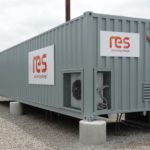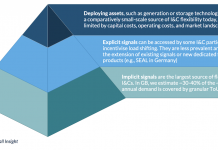 National Grid has awarded a 20MW frequency response contract to a grid-scale battery system operated by Renewable Energy Systems (RES). The system will provide enhanced frequency response type services, which help balance the grid in under a second.
National Grid has awarded a 20MW frequency response contract to a grid-scale battery system operated by Renewable Energy Systems (RES). The system will provide enhanced frequency response type services, which help balance the grid in under a second.
The contract was awarded outside of the main Enhanced Frequency Response tender, which takes place in July. National Grid seeks 200MW of superfast balancing capacity from that procurement exercise, which is largely expected to come from grid-scale batteries.
Under the deal, RES will provide dynamic frequency response, whereby it gets paid to help balance the system when frequency is either too high or too low. Dynamic frequency response is the most lucrative of all balancing markets and requires participants to provide constant balancing services in response to fluid demand and supply levels on the national power system.
With increasing amounts of renewable on the system and older thermal plant rapidly retiring, demand for frequency balancing services – also known as demand-side response – will increase exponentially over the coming years.
Technologies that can respond fastest and most reliably to increasingly frequent frequency fluctuations will be in the strongest position to profit from National Grid’s move away from balancing the grid solely via conventional generating plant.
Under the agreement, the RES system must be fully operational within the next 18 months.
National Grid senior account manager Adam Sims said the deal marks the first time battery storage would be used to provide such rapid frequency response. He added that it will dovetail with the Enhanced Frequency Response service to “support the network as we transition to a generation mix with greater levels of low cost renewable energy.”
RES energy storage manager John Prendergast said the firm had experience of providing superfast frequency response services in Canada and was one of the largest such providers in the USA. The contract with National Grid represents “a major step” in scaling its UK energy storage business, he said.
Prendergast urged Ofgem and Decc to quickly remove market barriers to wider deployment of energy storage in the UK. The department has said energy storage is “a top priority” and will shortly issue a consultation on smart energy systems.
At present, however, energy storage faces issues such as double charging, as it is classed as both generation and supply. Meanwhile distribution network operators, which would like to use large scale battery systems to manage local network demand fluctuations, are not allowed to own and operate them under current market rules.
The National Infrastructure Commission has urged Decc to examine those regulations and expedite the move to a smarter energy system, which it believes could save bill payers billions of pounds in avoided costs of new build generation.
Energy minister Andrea Leadsom recently said the department had heeded that message but sought to avoid knee-jerk regulation that could deliver perverse outcomes.
The Energyst, National Grid, aggregators and energy suppliers are holding a demand-side response conference on 8 September in London. There are 100 free places for businesses that want to provide demand-response services. Visit www.dsrevent.uk to reserve your place.
Related articles:
Free download: Demand-side response report
Open Energi and Forum for the Future launch DSR ‘movement’
Capacity market rule changes create opportunity for turn-down DSR
Major changes to capacity market and distributed generation charging regime proposed
Energy brokers and TPIs warn early capacity market could add 5% to power bills
New aggregator targets small firms with UPS for demand-response push
Government backs Adonis’ smartgrid plan, pledges £50m+ for storage and demand response
UK must prioritise smartgrid, says National Infrastructure Commission
National Grid says impact of solar requires greater system flexibility
Decc commits to annual plan and to consult on energy storage
National Grid to tender for 200MW of superfast demand response next month
Major changes to capacity market proposed
Hot technology: energy storage via heat battery
Utilitywise and Dell sign IoT energy management deal
Western Power Distribution ramps up demand-response trials, calls for participants
Smart grids ‘require local control and businesses must play or pay’
National Grid must simplify demand response to scale UK market
40% of firms say they could shift energy use as National Grid asks them to turn up
Dong enters demand-side response market with wind power balancing service
National Grid buys 475MW of demand response to cover winter
2016: the year half hourly settlement will hit your power bill
Government to consult on demand response in spring
Energy Technologies Institute: Let private firms run smartgrid trials
Flexitricity blasts transitional capacity market as Npower plots supermarket sweep
Grid buys 3.6GW of back up power to prevent blackouts
Flexitricity warns demand response cannot be rushed as winter looms
National Infrastructure Commission to focus on energy storage and demand response
Tempus: A five year old can see capacity market is anticompetitive
National Grid plots superfast grid balancing service
Many major energy users can’t be flexible, says manufacturing chief
National Grid moots demand side response rule changes as winter power margins tighten
Keep calm and scale demand response, says Scots energy inquiry
National Grid flags demand response changes, urges suppliers and TPIs to deliver
National Grid must simplify demand response to bring in UK businesses
Ofgem boss flags rule changes to speed demand response
National Grid launches major demand side push
Demand response: Suppliers and aggregators ignoring 80% of UK firms
UK firms with CHP plant could be paid to stop exporting power
National Grid: No margin? No sweat
Demand response provider teams with Honeywell, touts for new business
Free report: Directors’ energy outlook report 2016
Free report: How to finance energy efficiency
Follow us at @EnergystMedia. For regular bulletins, sign up for the free newsletter.



